Read Two Miserable Presidents Online
Authors: Steve Sheinkin
Two Miserable Presidents (9 page)
I
n February 1862, Grant led attacks on key Confederate forts on the Cumberland and Tennessee rivers. These rivers were like highways through the South. Whichever side controlled the rivers was able to control the whole region.
n February 1862, Grant led attacks on key Confederate forts on the Cumberland and Tennessee rivers. These rivers were like highways through the South. Whichever side controlled the rivers was able to control the whole region.
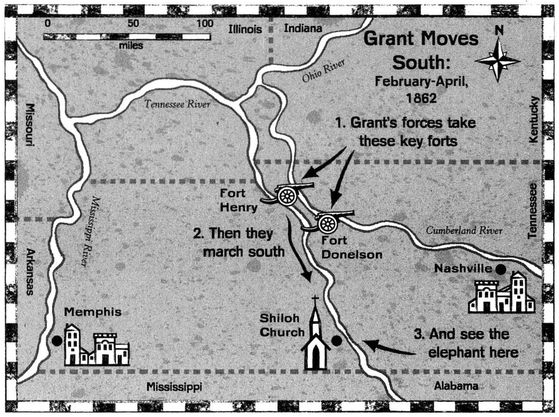
Union forces quickly captured Fort Henry. Then Grant surrounded Fort Donelson, trapping about 15,000 Confederate soldiers inside. The Confederate commander, Simon Buckner, sent a note to Grant
saying, basically,
Let's talk this over.
saying, basically,
Let's talk this over.
Grant refused. “No terms except unconditional and immediate surrender can be accepted,” he wrote back.
Buckner was pretty offended. He and Grant were old West Point pals, and he had once loaned Grant money when Grant was completely broke. But Buckner had no choiceâhe surrendered to Grant.
The Union victories at Forts Henry and Donelson were the biggest things to happen in the war so far. With control of important rivers, Northern forces began driving deeper into Southern territory.
The victories also gave U.S. Grant a new nicknameâ“Unconâditional Surrerider” Grant. He had a new reputation as a man with a fierce determination to succeed. One Union officer said that Grant wore “an expression as if he had determined to drive his head through a brick wall, and was about to do it.”
At the beginning of April 1862, Grant and his army were camped beside the Tennessee River, near a small church called Shiloh. He had about 40,000 soldiers, and another 35,000 were on their way to join him. Grant's plan was to launch a big attack as soon as those men arrived.
As usual, he wasn't thinking about what his enemy was up to.
H
is enemy was pretty busy. After losing those important river forts, Jefferson Davis was pressuring his Southern generals to go on the attack. “We have recently met with serious disasters,” he said. “What the people want is a battle and a victory.” General Albert Sidney Johnston got the job of attacking Grant.
is enemy was pretty busy. After losing those important river forts, Jefferson Davis was pressuring his Southern generals to go on the attack. “We have recently met with serious disasters,” he said. “What the people want is a battle and a victory.” General Albert Sidney Johnston got the job of attacking Grant.
Before sunrise on April 3, Johnston's soldiers woke to the sound of beating drums. Men scribbled quick notes to their families, like this one Joseph Lyman wrote to his wife: “Good-bye. If I do not
write it will be because I am working or fighting or wounded or sick or dead.”
write it will be because I am working or fighting or wounded or sick or dead.”
The soldiers were given three days' worth of foodâmost of them ate it all right away. Then they set out on a rainy, muddy march to battle.
This was still early in the war, and most soldiers on both sides had never been in combat. (Many of them had not even learned how to use their rifles yet.) With a mixture of terror and excitement, they called combat “seeing the elephant.” What would it be like to see the elephant? “I may run,” one Southern soldier wrote. “But if do I wish that some of our own men would shoot me down.”
A young Union soldier named Edward Edes had similar worries, as he told his father, “I have a mortal dread of the battlefield, for I have never yet been nearer to one than to hear the cannon roar & have never seen a person die. I am afraid that the groans of the wounded & dying will make me shake.”
Ready or not, 100,000 young men were about to see the elephant at Shiloh. “I have ordered a battle for daylight tomorrow,” General Johnston told his officers on April 5. “And I intend to hammer 'em!”
T
he next morning, while Grant's soldiers were yawning and cooking breakfast, Johnston's army charged out of the woods. Taken completely by surprise, Union soldiers ran around camp, shouting:
he next morning, while Grant's soldiers were yawning and cooking breakfast, Johnston's army charged out of the woods. Taken completely by surprise, Union soldiers ran around camp, shouting:
“The rebels are coming!”
“The rebs are out there thicker than fleas on a dog's back!”
“We are whipped! Cut to pieces!”
“Retreat! Save yourselves!”
Thousands of Union soldiers panicked, sprinting to the edge of the Tennessee River. Terrified men lay flat on the muddy riverbank, absolutely refusing to move. Some even leaped onto logs and started paddling across the water. Grant, who had sprained his ankle two days before, was racing around with a crutch tied to his horse. He kept passing more and more men running away from the battle and toward the river.
Unfortunately for the Confederates, winning can be just as confusing as losing for an untrained army. During the wild charge into the Union camp, Confederate regiments got mixed up and separated from their commanders. And when hungry Southern soldiers saw abandoned breakfasts cooking over campfires, many couldn't resistâthey stopped to grab hunks of meat and slurp cups of coffee. One soldier was seen running around with a huge wheel of cheese stuck on his bayonet.
Another man grabbed a Union mule and jumped on its back. The mule suddenly took off at top speed, racing across the field toward a line of Union soldiers. Confederate men cheered this fearless charge: “Just look at that brave man, charging right in the jaws of death!”
But the guy on the mule was actually trying to stop the animal. “It arn't me, boys, it's this blarsted old mule,” he yelled. “Whoa! Whoa!”
A
s the morning wore on, the two sides settled into some serious fighting. And the battle of Shiloh quickly turned into the biggest, bloodiest battle of the war so far. “Everywhere it was one never-ending, terrible roar,” said a Union soldier. A Confederate soldier said, “Men fell around us like leaves.” The air in one part of the battlefield was so thick with buzzing bullets that soldiers called it the “Hornets' Nest.”
s the morning wore on, the two sides settled into some serious fighting. And the battle of Shiloh quickly turned into the biggest, bloodiest battle of the war so far. “Everywhere it was one never-ending, terrible roar,” said a Union soldier. A Confederate soldier said, “Men fell around us like leaves.” The air in one part of the battlefield was so thick with buzzing bullets that soldiers called it the “Hornets' Nest.”
“I will lead you!” shouted the Confederate general Johnston as he charged his horse into the Hornet's Nest. The charge drove the Union soldiers backâbut Johnston suddenly felt faint and nearly fell from his horse.
“General, are you hurt?” asked an officer.
“Yes, and I fear seriously,” Johnston replied.
In the fury of combat, Johnston had not even felt the bullet that sliced open an artery behind his right knee. Now his boot was filled with blood, and more was flowing freely down his leg. Johnston got down from his horse and bled to death before help could arrive.
Darkness finally ended the fighting. The Confederates had backed Grant's army up against the Tennessee River. But the battle was far from over.
T
he Union general William Tecumseh Sherman had fought nonstop since morning. That night Sherman found General Grant sitting under a tree, smoking a cigar. The two friends had a quick strategy meeting, which began like this:
he Union general William Tecumseh Sherman had fought nonstop since morning. That night Sherman found General Grant sitting under a tree, smoking a cigar. The two friends had a quick strategy meeting, which began like this:
“Well, Grant, we've
had the devil's own day
of it, haven't we.”
had the devil's own day
of it, haven't we.”
William Sherman
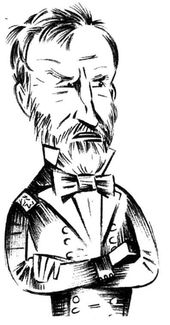
“Yes, yes [puffing on
cigar]. Lick 'em
tomorrow, though.”
cigar]. Lick 'em
tomorrow, though.”
Ulysses S. Grant
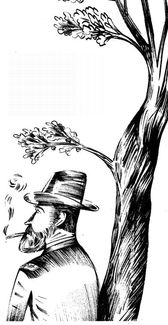
That was Grantsâalways thinking about going on the attack. And he knew he would have the advantage the next day. As he spoke with Sherman, thousands of fresh Union soldiers were arriving in camp.
First everyone had to live through a night of pure horror. Heavy rain began falling and flashes of lightning lit up awful scenes on the battlefield. Everywhere lay dead bodies, and parts of bodies. Wounded men lay helpless in the pounding rain, calling out for help. And bombs exploded all night long as Union gunboats blasted an endless series of shells into the Confederate camp.
Grant launched a massive attack early the next morningâand his , prediction proved correct. The exhausted Confederate soldiers were driven back, forced to retreat south to Mississippi. Shiloh was a victory for the North, though both sides ended up more or less where they started.
It was also a victory that left everyone in shock. In just two days, more than 23,000 men had been killed or wounded. More Americans were killed or wounded in two days at Shiloh than in the American Revolution, the War of 1812, and the Mexican War combined.
The terrible message of the battle of Shiloh was clear. The North and South had gotten themselves into a much bigger, much bloodier war than anyone had expected.
There was always something to ruin Abraham Lincoln's day. Any time he got some good news, bad news was close behind. Grant's victory at Shiloh was a good thing, right? But then Northern newspapers and politicians started flooding Lincoln with complaints. They were furious that Grant's army had been taken by surprise at Shiloh. Some even charged that Grant had been drunk on the battlefield. Lincoln was suddenly under heavy pressure to fire his most successful general.
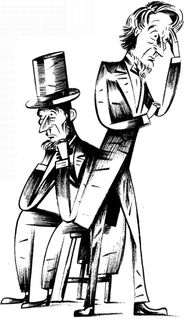
A
braham Lincoln listened patiently to the complaints about General Grant. Grant had made mistakes, Lincoln admitted. And he certainly had a drinking problemâthough rumors of him drinking during battle were false. In any case, the Union desperately needed generals who were not afraid to attack. As Lincoln said of Grant, “I can't spare this manâhe fights!”
braham Lincoln listened patiently to the complaints about General Grant. Grant had made mistakes, Lincoln admitted. And he certainly had a drinking problemâthough rumors of him drinking during battle were false. In any case, the Union desperately needed generals who were not afraid to attack. As Lincoln said of Grant, “I can't spare this manâhe fights!”
The early months of 1862 brought more good news/bad news to Lincoln's desk. The good news: Union ships in the Gulf of Mexico entered the Mississippi River and began blasting their way north through Louisiana. In April, Union ships captured New Orleans, the South's busiest port and biggest city.
The bad news? As you might expect, the South's biggest city was full of Southerners. Union soldiers had a serious problem controlling this angry populationâespecially the women. “Oh! How I hate the Yankees!” cried one Southern woman. The women of New Orleans insulted Union soldiers and spat on them in the street. A few women even leaned out upstairs windows and emptied chamber pots onto soldiers' heads.
Then there was some good news: after eight months of delays, General George McClellan was finally ready to march his massive army toward Richmond. At least, he said he was ready. The bad news: McClellan's army was moving very slowly, very cautiously. Lincoln sent telegrams practically begging McClellan to get on with the attack. “He's got the slows,” Lincoln groaned.
F
rom Jefferson Davis's point of view, McClellan was moving fast enough. The Union army was approaching Richmond, and the entire city was beginning to panic. Davis decided that his wife, Varina, and their children should move to a safer location. But after they left, he lay awake nights, missing them terribly. “Oh, mother, Uncle Jeff is miserable,” wrote Davis's niece when she came for a visit.
rom Jefferson Davis's point of view, McClellan was moving fast enough. The Union army was approaching Richmond, and the entire city was beginning to panic. Davis decided that his wife, Varina, and their children should move to a safer location. But after they left, he lay awake nights, missing them terribly. “Oh, mother, Uncle Jeff is miserable,” wrote Davis's niece when she came for a visit.
He had good reason to be. The losses at Shiloh and New Orleans were painful blows. And like Lincoln, Davis faced a constant stream of criticism from newspapers and political leaders. Unlike Lincoln, Davis took every insult personally. “I wish I could learn just to let people alone who snap at me,” he wrote to Varina. Instead, he lashed back at anyone who dared to question him. “Jefferson Davis now treats all men as if they were idiotic insects,” complained one Southern newspaper.
It hardly helped Davis's mood that the South was facing some major challenges in this war.
“The enemy greatly outnumber
us, and have many advantages in
moving their forces.”
us, and have many advantages in
moving their forces.”
Jefferson Davis
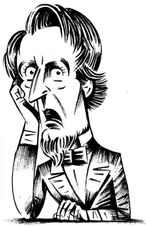
The North simply had more of everythingâmore people, more soldiers, more railroads and ships, more factories to produce guns and ammunition. The South
came up with some creative solutions, such as melting down church bells for metal to make cannons. Southern newspapers even urged families to save their urineâit contains a chemical needed to make gunpowder.
came up with some creative solutions, such as melting down church bells for metal to make cannons. Southern newspapers even urged families to save their urineâit contains a chemical needed to make gunpowder.
The South did have a few advantages, though. They were fighting on their own land, and soldiers always seem to fight extra hard when they're defending their homes. Also, when the war started, many of the country's most talented military leaders went south. Now that Union soldiers were closing in on Richmond, Jefferson Davis turned to two of those men: Robert E. Lee and Stonewall Jackson.
R
obert E. Lee knew that 100,000 Union soldiers were marching toward Richmond. He looked over his maps and saw that there were another 40,000 Union soldiers in the nearby Shenandoah Valley. Somehow Lee had to keep them thereâkeep them from joining the attack on Richmond.
obert E. Lee knew that 100,000 Union soldiers were marching toward Richmond. He looked over his maps and saw that there were another 40,000 Union soldiers in the nearby Shenandoah Valley. Somehow Lee had to keep them thereâkeep them from joining the attack on Richmond.
This was a job for the quiet and secretive Stonewall Jackson. Hiding his plans even from his own soldiers, Jackson began a series of quick, confusing marches back and forth across the Shenandoah Valley. His army of 17,000 kept showing up where Union generals least expected them. Jackson's men marched 350 miles in thirty days, winning battle after battle, capturing thousands of prisoners and badly needed guns.
The Union soldiers in the Shenandoah Valley were so worried about Stonewall, they never made it to Richmond. And Jackson became a Southern heroâthough a slightly strange one. He was known to suck on lemons for hours at a time (especially during battle), and he refused to eat pepper, saying it made his left leg hurt. He
also fell asleep at odd times. “He could sleep in any position,” one of Jackson's staff members remembered, “in a chair, under fire, or on horseback.”
also fell asleep at odd times. “He could sleep in any position,” one of Jackson's staff members remembered, “in a chair, under fire, or on horseback.”
Sure enough, as Jackson's exhausted army headed back to Richmond, Jackson fell fast asleep on his horse, rocking and swaying in the saddle. A young soldier, thinking this was some drunk guy, came up and shouted, “Hello! I say, old fellow, where did you get your liquor?”
Jackson woke suddenly and looked at the officers around him. “Mr. McGuire, did you speak to me? Captain Pendleton, did you? Somebody did.”
The young soldier realized his mistake. “Good God! It's old Jack!” he shouted. He ran from the road, jumped over a fence, and sprinted across a field.
Jackson laughed. Then he got off his horse, lay down on the ground, and took a nap.
O
ne of Jackson's secret weapons in the Shenandoah Valley was an eighteen-year-old spy named Belle Boyd.
ne of Jackson's secret weapons in the Shenandoah Valley was an eighteen-year-old spy named Belle Boyd.
Boyd had been living with her family in the valley when Union forces arrived in 1861. A bunch of Union soldiers celebrated the fourth of July by getting drunk and breaking into homes. They started shattering plates, blasting their guns through windows, and tossing furniture into the street. After smashing up Belle's home, they took out an American flag and prepared to fly it over the house.
“Men,” warned Belle's mother, “every member of this household will die before that flag is raised over us.”
One of the soldiers shoved Mrs. Boyd and spit out a string of violent curses. For Belle, that was it. “I could stand it no longer ⦠.”
she wrote, “My blood was literally boiling in my veins. I drew out my pistol and shot him.”
she wrote, “My blood was literally boiling in my veins. I drew out my pistol and shot him.”
The soldier died, but Boyd escaped punishmentâa Union court ruled she had acted in self-defense.
The next year, when Stonewall Jackson came to the valley, Boyd began gathering information and passing coded messages to Jackson's army. One day she found out that Union officers would be meeting in a nearby hotel. She hid in a closet on the floor above the meeting room and listened to everything through a crack in the floor.
Jackson's army was fighting its way into town, and Boyd now had valuable information about Union plans. She ran into the street to find someone to deliver the news to Jackson.
“No, no,” said all the men she met. “You go.”
There was no time to think about itâshe took off running toward the sounds of battle. Union soldiers shot at her as she raced across the battlefield. A few bullets actually sliced through her dress without hitting her.
Belle Boyd

“The rifle-balls flew thick and fast about me, and more than one struck the ground so near my feet as to throw the dust in my eyes.”
Southern soldiers cheered when she reached them. One officer recognized her and said, “Good God, Belle, you're here! What is it?”
Panting from her run, Boyd delivered
the information. Then she ran back home.
the information. Then she ran back home.
After winning another key victory, Stonewall Jackson dashed off a quick note: “MISS BELLE BOYD: I thank you, for myself and for the army, for the immense service that you have rendered your country today.âHastily, I am your Friend, T. J. JACKSON”
Belle Boyd continued spying (despite being thrown in prison a couple of times) and soon became famous all over the world. A French newspaper nicknamed her “La Belle Rebelle”âthe beautiful rebel.
N
ow it's time to check in on General George McClellan. We haven't missed muchâhe's still inching forward. And Lincoln is still begging him to speed up. “You must act,” Lincoln telegraphed.
ow it's time to check in on General George McClellan. We haven't missed muchâhe's still inching forward. And Lincoln is still begging him to speed up. “You must act,” Lincoln telegraphed.
“The time is very near when I shall attack Richmond,” McClellan insisted.
But Mac wanted more information before moving forward. He turned to an inventor named Thaddeus Lowe, who had built huge balloons in which he could float hundreds of feet above the enemy camp. Since there was no way to control the balloons in the air, they were tied to the ground with very long ropes.
Early one morning the Union general Fitz John Porter decided to have a look at the Confederate camp. He climbed into the basket, inflated the balloon, and started floating up. Then there was a sudden CRACK!âthe rope holding the balloon to the ground snapped in half. Thousands of sleepy Union soldiers looked up and saw General Porter leaning out of the basket, waving his hands and yelling something that no one could hear.
“Open the valve!” shouted Thaddeus Lowe, pointing up to a rope connected to the valve that would let out the hydrogen gas that
made the balloon rise. Soldiers ran along under the balloon yelling, “The valve! The valve! Open the valve!” But Porter couldn't reach the valve. He kept floating up, up, and away ⦠out over Confederate territory.
made the balloon rise. Soldiers ran along under the balloon yelling, “The valve! The valve! Open the valve!” But Porter couldn't reach the valve. He kept floating up, up, and away ⦠out over Confederate territory.
Deciding to make the best of it, Porter took out his telescope and started studying the enemy camp. Confederate soldiers shot at the balloon but couldn't reach it. Both armies watched in amazement as shifting winds blew Porter back and forth, finally sending him crashing into an army tentâluckily for him, a Union army tent. Porter climbed out from the folds of the deflated balloon, unhurt.

Other books
Gears of the City by Felix Gilman
Even Steven by John Gilstrap
Stolen Life by Rudy Wiebe
Love Is Murder by Allison Brennan
The City on the Edge of Forever by Harlan Ellison
01_The Best Gift by Irene Hannon
The Idea of Him by Holly Peterson
Let the Devil Sleep by John Verdon
Slocum #422 by Jake Logan
Born This Way by Paul Vitagliano
